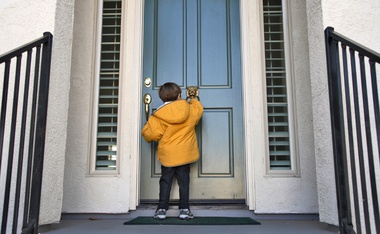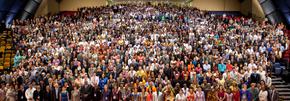The views expressed in our content reflect individual perspectives and do not represent the authoritative views of the Baha'i Faith.
My throat constricted as I extended my hand hesitantly. Aware of my seven-year-old daughter and my sixty-something friend standing behind me, I pushed the doorbell with more confidence than I felt.
Despite my irrepressible introversion and inescapable foreignness — I’m an American who lives in England — I had resigned myself to being the leader of this group. After all, Americans are supposed to be good at this being-friendly thing, and perhaps there was something to the stereotype. Also, compared to many of the shy English people I’d met here, I was positively outgoing.
RELATED: Cultivating Selfless Service in Young Hearts and Minds
We waited on the doorstep uncomfortably. Thirty seconds? Two minutes? Hard to tell with my stomach tying itself in knots. I shrugged my shoulders back to improve my posture and compulsively ran my tongue over my teeth to check for remnants of lunch. I stepped forward again and knocked loudly on the door. The sounds of muffled shuffling and the knob turning forced my face into what I hoped was a pleasant, non-threatening expression. An I’m-not-trying-to-sell-you-anything-please-don’t-slam-the-door-in-my-face kind of smile.
“Yes?” said a slightly stooped lady with neatly coiffed white hair.
“Hi! I’m Talia, your neighbor,” I said brightly. “I live just across the street,” I pointed in the general direction of our house, “and this is my daughter, Maëlys, and my friend, Sue.”
“Hello,” she said with a small, politely puzzled smile.
Conscious of my accent and the possibility of her having hearing problems, I forced myself to speak slower than usual and to adopt the intonation of the locals.
“We’re trying to build community in our neighborhood,” I explained, “and we’re inviting you to join us on Sunday for a little lunchtime gathering at our house to get to know your neighbors.”
To my great relief, she warmed up immediately. “Oh, what a lovely idea!” she exclaimed. “That’s how it used to be, back in the day. But now, I hardly know anyone around here.”
We chatted for a few minutes, Sue chiming in and connecting with her on both a local person and an older person level. She said she would do her best to come on Sunday but implied that it was a little difficult for her to get out these days. After she closed her door, we looked at each other, smiles of relief brightening our faces. One down, fourteen to go.
Our door-to-door invitation campaign took only an hour, but it had been the result of months of planning, groundwork, and no small measure of fretting and procrastination. That same day, my husband, Sue’s husband, and our three-year-old son were making the rounds like we were, but on the opposite side of our busy street. We had limited ourselves to about a block in length (they don’t really do blocks in England, what with most streets being labyrinthine and all), so by the time we’d reached the end of our allotted thirty or so houses, we felt socially fatigued, but not completely exhausted, with the real work yet to come.
You’re probably wondering: what would prompt a small group of friends to go knocking on their neighbors’ doors? What would impel us to attempt to breach the battlements of these strangers’ personal castles with smiles and promises of food and conviviality?
Nowadays, most of us go home from work or school and collapse into the safety and artificial connectedness of our digital bubbles, myself included. We shut out the outside world. We have been quite successfully convinced that the answers to our plethora of problems lie in our phones. Feeling lonely? Send someone a message on WhatsApp. Feeling out-of-shape? Do a session on your workout app. Feeling envious? Post a photo on Instagram. Feeling anxious? Listen to a guided meditation on YouTube. Millions of people around the globe have bought into the hollow lie that material and spiritual fulfillment can be found in our devices.
But for Baha’is like myself and my husband, we have spent the last twenty or so years being gradually nudged in a different direction. The Baha’i Faith, the youngest of the world religions, and the second-most widespread after Christianity, teaches that only unity will solve the world’s problems. Baha’u’llah, the prophet and founder of the Baha’i Faith, emphasized that “The well-being of mankind, its peace and security, are unattainable unless and until its unity is firmly established.” The Baha’i writings unequivocally champion the oneness of humankind:
On racial prejudice: “Close your eyes to racial differences and welcome all with the light of oneness.”
On extremes of wealth and poverty:
Hearts must be so cemented together, love must become so dominant that the rich shall most willingly extend assistance to the poor and take steps to establish these economic adjustments permanently.
When all mankind shall receive the same opportunity of education and the equality of men and women be realized, the foundations of war will be utterly destroyed. Without equality this will be impossible because all differences and distinction are conducive to discord and strife.
At the heart of every seemingly insurmountable obstacle humanity faces is the fact that humans are not seeing each other as equals. Many don’t view their neighbors as noble souls who have every bit as much right to health and happiness as they do. But that all-embracing vision of oneness described in the Baha’i quotations above? That’s the one thing that will bring about a brighter future for our planet — not politics, not technology, not tax reform, but the unity that truly bonds us together as one.
Without unity, climate change will destroy our well-being, bombs will destroy our neighborhoods, and technology-induced apathy will destroy any pull we might feel toward the responsibility to stop them.
RELATED: My Neighborhood Wonders: Why Can’t We Just Teach Goodwill?
Granted, building unity takes time. Connecting hearts together is not a quick fix. There’s no instantaneous gratification built in, for one thing, and it’s not something that others can do for us. So it’s not easy — but it is necessary. That’s why my friends and I were out knocking on doors, putting aside our fears in order to meet our neighbors and invite them to join us on this grassroots path toward unity. As humble and insignificant as our efforts feel sometimes, it’s encouraging to know that Baha’is and their friends around the world are universally engaging in the same community-building endeavors that I am.
Plus, it’s working. Neighborhoods and villages are being transformed. In Bihar Sharif, India, caste prejudice and child marriages have sharply declined as the community has embraced the unifying influence of collective worship and education. In northern Colombia, drug use and gang violence have given way to a culture of mutual support and empowerment. In North Carolina, hundreds of children and young people have come together to learn about and engage in selfless service to society. These success stories are echoed in thousands of other locations around the globe, and they give me the courage to make a start in my own community.
So, did our local effort bear fruit, you might ask? Did my neighbors show up for our get-to-know-you gathering? As it so happened, they did. The Kurdish bachelors next door brought their guitar-like saz and a giant cake to share. The retired British librarian stayed long after everyone else because he was craving social connection. The biracial eighteen-year-old who was studying Spanish promised to help the El Salvadoran refugees with English practice. Even our Muslim neighbor who couldn’t make it due to Eid celebrations came over the next day with gifts of food. On the surface, most of the people who came to my house had very little in common.
But what brought us together was a recognition of our desperate need for unity and connection — real heart-to-heart connection, not just the kind we try to find on our phones.
After all, the material, social, and spiritual health of our communities depends on us taking these little steps towards oneness. The good news is, anyone and everyone can do it. The Universal House of Justice, the democratically-elected global administrative body of the Baha’is, says that the task at hand is simple yet profound: “Extend then to everyone the hand of friendship, of common endeavour, of shared service, of collective learning, and advance as one.”
















Comments
Sign in or create an account
Continue with Googleor